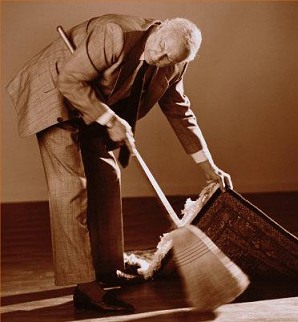Fukushima “Decontamination” Measures Are Making Things Worse
Corruption and Cover-Up Lead to SPREAD – Rather than Containment – of Radiation from Fukushima Disaster

* * *
* * *
* * *
We’ve previously noted:
- Japan has severely underplayed the amount of radiation from Fukushima, putting Japanese residents and U.S. navy sailors in jeopardy
- Experts call Japan cleanup effort meaningless … an endless task that’s simply spreading around radiation
- Tepco has taken extraordinary steps to hide radiation by blocking radiation monitors with thick metal and other foreign objects. And see this
In a series of essays called “Crooked Cleanup”, leading Japanese news source Asahi shows the level of corruption and incompetence.
Cleanup crews in Fukushima Prefecture have dumped soil and leaves contaminated with radioactive fallout into rivers. Water sprayed on contaminated buildings has been allowed to drain back into the environment. And supervisors have instructed workers to ignore rules on proper collection and disposal of the radioactive waste.
***
The decontamination work witnessed by a team of Asahi Shimbun reporters shows that contractual rules with the Environment Ministry have been regularly and blatantly ignored, and in some cases, could violate environmental laws.
***
In signing the contracts, the Environment Ministry established work rules requiring the companies to place all collected soil and leaves into bags to ensure the radioactive materials would not spread further. The roofs and walls of homes must be wiped by hand or brushes. The use of pressurized sprayers is limited to gutters to avoid the spread of contaminated water. The water used in such cleaning must be properly collected under the ministry’s rules.
***
From Dec. 11 to 18, four Asahi reporters spent 130 hours observing work at various locations in Fukushima Prefecture.
At 13 locations in Naraha, Iitate and Tamura, workers were seen simply dumping collected soil and leaves as well as water used for cleaning rather than securing them for proper disposal.
Photographs were taken at 11 of those locations.
The reporters also talked to about 20 workers who said they were following the instructions of employees of the contracted companies or their subcontractors in dumping the materials. A common response of the workers was that the decontamination work could never be completed if they adhered to the strict rules.
Asahi reporters obtained a recording of a supervisor at a site in Naraha instructing a worker to dump cut grass over the side of the road.
Workers involved in cleaning up the radioactive fallout from the Fukushima No. 1 nuclear plant disaster expressed concerns. One even apologized for what he did.
But they were on the bottom employment levels in the decontamination process, and their words apparently meant nothing to their supervisors.
***
The supervisor from Dai Nippon Construction told the 30 or so workers under his watch to dump whatever would not fit into the bags or to throw materials down the slope outside of the line marked by the pink tape. Whenever the supervisor was not present, the person taking his place gave similar instructions.
The man questioned if the work could actually be called decontamination. He confronted the supervisor about his instructions on Nov. 27 and recorded the conversation.
The man can be heard asking, “Is it all right to just dump the stuff?”
The supervisor replied: “Yeah, yeah, it’s OK. It can’t be helped.”
***
“Even though I was following an order, I am sorry for polluting the river,” the man said.
Indeed, “clean-up measures” often make the radiation ariborne … making it more dangerous:
The airborne radiation level near the gutter before the cleaning water flowed in was 0.8 microsievert per hour. The radiation level near the cleaning water hovered between 1.9 and 2.9 microsieverts. The larger figure is close to the cutoff point in determining if residents should evacuate.
***
In some cases, radiation levels at homes have even increased after decontamination, leading some workers to suspect that radioactive materials were blown into the area by wind.
The only actual decontamination work which was done appears to have been right around radiation monitors, to create false low readings:
We were told to clean up only those areas around a measurement site.
Even worse, Japan is spreading radioactivity throughout Japan – and other countries – by burning radioactive waste in incinerators not built to handle such toxic substances.
One of our main themes is that trying to cover up problems only makes them worse. Japan is once again proving that this is a bad strategy …


